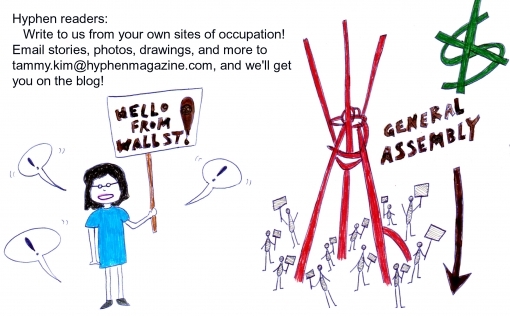crossposted from hardboiled.
When Occupy Wall Street first began in the middle of
September, nobody could have predicted the extent to which it would grow.
Driven by anger at the greed of the nation’s wealthiest one percent, the
movement has traveled across the country to the University of California, Berkeley.
Occupy Cal began on Nov 9, and a Day of Action took place on Nov 15 in Berkeley
with around 2,000 students involved. The strength of the rest of the 99 percent
endured throughout Occupy Cal even in the face of unwarranted police brutality
on students and faculty alike.
How
does all this relate to the API community? Why would those “model minorities,”
which is a problematic term in itself, be frustrated at the exploitation of the
poor and the unchecked power of the wealthy? After all, most of them are
probably so well off that they belong to the one percent, right? Wrong. On Nov
14, my Facebook newsfeed was littered with posts about the progressive API
community’s plans for Occupy Cal. APIs were persuaded to all wear red the next
day as a sign of solidarity. Sure enough, when the students marched through the
city of Berkeley, many API students could be seen in red holding signs that
read, “Asian American and Proud,” and calling for funds for Ethnic Studies and
the language departments.
“It’s
important to stand up for the API community, and … we are the 99 percent. We are
not against the police, [and] we are nonviolent, so this is a good way to
demonstrate how much power we have together,” said Samantha Lai, a second year
student at UC Berkeley who participated in Occupy Cal.
Indeed,
the past two years have been difficult for API students in Berkeley. Attempts
had been made to consolidate the Ethnic Studies department, the African American
Studies department, and the Gender and Woman’s Studies department into one.
This change would cut an immense amount of resources from these departments and
from programs like Asian American Studies, as well as deprive students who seek
to understand their background of a quality education. Furthermore, Southeast
Asian, Filipino, and Pacific Islander students are grossly underrepresented in
the UC system, and 40-44 percent of undocumented students in the UC system are
API. One should not be surprised that numerous API students marched on Nov 15
to protest the wealthy elite who control a system that imposed such disparities
on our community.
With
a potential tuition increase of 81 percent, access to any education becomes
limited, and many API youths may never be able to take an Asian American
Studies class. Southeast Asian, Filipino, and Pacific Islander students would
continue to be underrepresented, and undocumented API students may no longer
have enough financial support to continue their education. The greed of the
richest one percent of America has damaged society and our system of education,
and its impact is very painfully felt within the API community at UC Berkeley.
In the words of Gabbie Guison, a
student at UC Berkeley, “[We march] for our community. We just have all these
fee increases that are going up, and in a society where higher education is
encouraged for social mobility, how are we to accomplish social mobility if we
can’t even afford it? This is supposed to be a free education. Like what the
fuck is going on?”
* * *
Steven Cong is publicity director at hardboiled: asian pacific american issues newsmagazine at UC Berkeley.










Comments